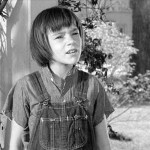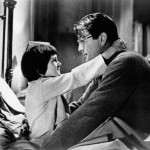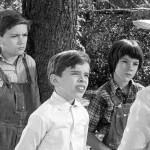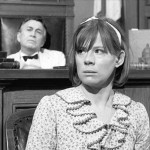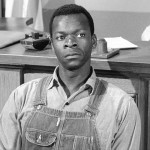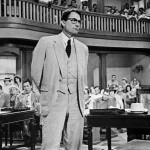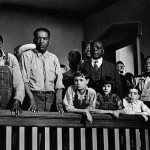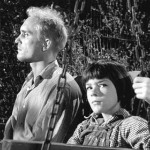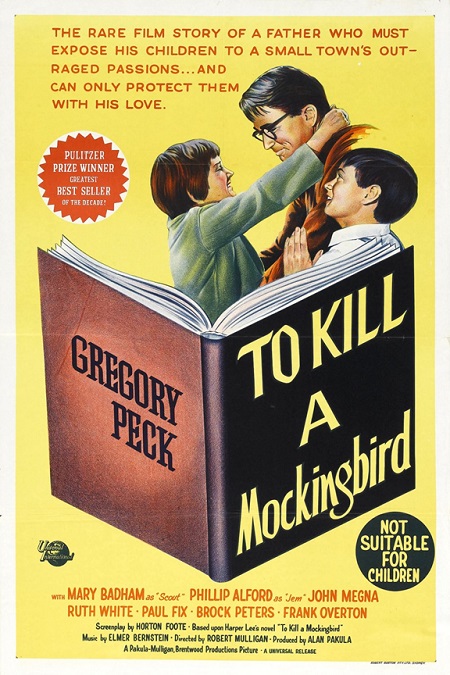
To Kill a Mockingbird – 1962
This was an excellent movie. It was touching, inspirational, culturally significant, incredibly well-acted, beautifully written, and wonderfully directed. It was up against some pretty stiff competition in the Best Picture category. Films like The Longest Day, The Music Man, Mutiny on the Bounty, and the winner, Lawrence of Arabia seemed to be raising the bar.
To Kill a Mockingbird had something that none of those other films had. It had a wholesome tenderness that is a rarity in film. Gregory Peck played the leading character of Atticus Finch, a lawyer in a poor Southern town in 1933. He was a widowed man with two young children to care for. And it was that loving relationship that he shared with his children that stood out to me as one of the most phenomenally portrayed aspects of the film. Peck played the kind of father that we all wish we had. He was kind and gentle, but firm in his beliefs and willing to fight to uphold them.
His children, Jem and Scout, were played by Phillip Alford and Mary Badham, respectively. These two characters were incredibly well-written. Not only was sufficient time devoted to the development of their individual personalities, but the depiction of the relationship between two siblings was deftly handled. The subtle hierarchy between the older Jem and the younger Scout was beautifully depicted. Without a doubt, these two kids turned in some fantastic performances. Badham, who was 6 years old at the time, was the youngest person to ever be nominated for Best Supporting Actress.
The central plot of the film revolved around a court case in which a black man, Tom Robinson, played by Brock Peters, was accused of beating and raping a white girl, Mayella Violet Ewell, played by Collin Wilcox. Atticus takes the case. During the mock trial, he proves that not only is Tom Robinson innocent, but heavily implies that it was the girl’s own father who had beat her and raped her.
Finch’s closing argument is an impassioned speech against racism, so eloquently delivered, that, though it is long, I have paraphrased bits and pieces of it here. He says, “To begin with, this case should never have been brought to trial. The state has not produced one iota of medical evidence that the crime Tom Robinson has been charged with ever took place. It has relied instead upon the testimony of two witnesses, whose evidence has been called into serious question. The witnesses for the State have presented themselves to you in the cynical confidence that you gentlemen would go along with them on the assumption… the evil assumption that all Negroes lie, all Negroes are basically immoral beings, all Negro men are not to be trusted around our women. An assumption which is, in itself, a lie. Now I am confident that you gentlemen will review, without passion, the evidence that you have heard, come to a decision, and restore this man to his family. In the name of GOD, do your duty. In the name of God, believe… Tom Robinson.” Unfortunately, prejudice wins out and Robinson is found guilty.
Peck was truly incredible and he earned the Academy Award for Best Actor, a well-deserved honor. I have also read that Peck, in real life, was very much like the soft-spoken and gentle character he portrayed in the film. Even though he had a very prolific career, the character of Atticus Finch is widely considered to be his most significant role.
And finally, the last and most enigmatic part of the film is the character of Arthur “Boo” Radley, played by Robert Duvall in his big-screen debut. He is never actually seen until the final few moments of the film, though he is an object of fear for the children of the town. He lived in the scary house up the street, the house their parents warned them away from. He was so violent he had to be chained up in the basement. But in reality, he turned out to be a kind, gentle, shy recluse.
He watched over the children of the town, always staying out of sight. But in the end, when Jem and Scout are attacked by a drunk Bob Ewell, played by James Anderson, it is Boo who saves them by killing their assailant. He carries the unconscious Jem home and finally reveals himself. The sheriff knew that justice for the Robinson case had finally been carried out, and that convicting Boo for defending the innocent children would be a “sin.” Duvall did a great job with his small role. It was a powerfully profound ending to a wonderfully written and well-acted film.
